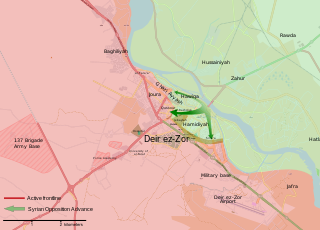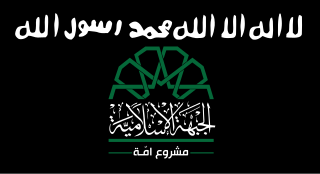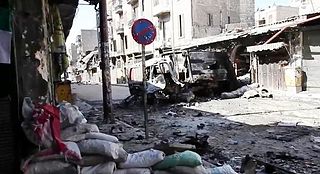
The Free Syrian Army (FSA) is a loose faction in the Syrian Civil War founded on 29 July 2011 by officers of the Syrian Armed Forces whose goal is to bring down the government of Bashar al-Assad. A formal organization at its founding, its structure gradually dissipated by late 2012, and the FSA identity has since been used by various opposition groups.

Protests against the Syrian government and violence had been ongoing in the Syrian city of Deir ez-Zor since March 2011, as part of the wider Syrian Civil War, but large-scale clashes started following a military operation in late July 2011 to secure the city of Deir ez-Zor. The rebels took over most of the province by late 2013, leaving only small pockets of government control around the city of Deir ez-Zor.

This is a broad timeline of the course of major events of the Syrian civil war. It only includes major territorial changes and attacks and does not include every event.
Riad Mousa al-Asaad is a Syrian military leader and politician. He is the Deputy Prime Minister for Military Affairs of the Syrian Salvation Government, a position he has held since 2 November 2017. Before this, he was a military commander of the Free Syrian Army. He was a former Colonel in the Syrian Air Force who defected to the opposition in July 2011.

The siege of Homs was a military confrontation between the Syrian military and the Syrian opposition in the city of Homs, a major rebel stronghold during the Syrian Civil War. The siege lasted three years from May 2011 to May 2014, and resulted in an opposition withdrawal from the city.

The first of the two battles in al-Qusayr was fought by the Syrian army and Shabiha against the Free Syrian Army in the small city of Al-Qusayr, near Homs, during late winter and spring of 2012.

Foreign involvement in the Syrian Civil War refers to political, military and operational support to parties involved in the ongoing conflict in Syria that began in March 2011, as well as active foreign involvement. Most parties involved in the war in Syria receive various types of support from foreign countries and entities based outside Syria. The ongoing conflict in Syria is widely described as a series of overlapping proxy wars between the regional and world powers, primarily between the US and Russia as well as between Iran and Saudi Arabia.

The Battle of Ras al-Ayn was a series of armed clashes for control of the town of Ras al-Ayn during the Syrian Civil War, mainly between the Kurdish-majority People's Protection Units (YPG) and an alliance of Syrian rebel groups, with the occasional involvement of the Syrian Armed Forces. As result of the battle's first phase, the Syrian Army was expelled from the city by Syrian rebels, whereupon the latter attacked the YPG-affiliated fighters in Ras al-Ayn. In the following months, the city was effectively divided into rebel-held and YPG-held areas, with intermittent fighting resulting in the gradual expansion of the YPG's territory in the city and its surroundings. Islamist and jihadist factions soon became dominant among the rebels in the region, further contributing to tensions with the secular-leftist YPG. In July 2013, the battle's final phase erupted and ended when an alliance of YPG-led troops completely expelled the rebels from Ras al-Ayn.

Salim Idris is the former Chief of Staff of the Supreme Military Council (SMC) of the Syrian National Army, a Syrian armed opposition group. He has a PhD in "electronic radars" and speaks five languages, including English. An East German-trained electronics professor, he was a general in the Syrian Army when he defected in July 2012. Idris is widely considered to represent the moderate elements of Syria's armed opposition, as armed opposition leaders under his leadership have subscribed to the pro-democracy Proclamation of Principles.
The Battle of Yarmouk Camp was a period of fierce clashes in Yarmouk Camp during the Syrian civil war. Yarmouk is a district of Damascus that is home to the biggest community of Palestinian refugees in Syria. The fighting was between the Syrian Army and PFLP-GC on one side, and Syrian rebels on the other. The rebels included the Free Syrian Army (FSA) and a group made up of Palestinians, called Liwa al-Asifa or Storm Brigade. On 17 December, it was reported that the FSA and anti-Assad Palestinians had taken control of the camp. The FSA and Syrian Army agreed to leave Yarmouk as a neutral, demilitarized zone, but sporadic clashes continued.
The second of two battles in al-Qusayr started on 19 May 2013, as part of the larger al-Qusayr offensive, launched in early April 2013 by the Syrian Army and the Lebanese militia Hezbollah, during the Syrian civil war, with the aim of capturing the villages around the rebel-held town of al-Qusayr and ultimately launching an attack on the town itself. The region was strategically important as a supply route for rebels fighting Syrian government forces in Homs and also for the Syrian government, as it lies between the capital, Damascus, and the Syrian coast, a stronghold for Assad supporters.
Jaysh al-Islam, formerly known as Liwa al-Islam, is a coalition of Islamist rebel units involved in the Syrian Civil War.
A number of states and armed groups have involved themselves in the ongoing Syrian Civil War as belligerents.

The Supreme Military Council (SMC) was the highest military leadership of the Free Syrian Army (FSA) from late 2012 to at least mid-2014. The establishment of the organisation was announced on 7 December 2012 with the backing of western and Arab powers as a means of financing and arming Syrian rebel forces.

The Islamic Front was a Sunni Islamist rebel group involved in the Syrian Civil War, which was formed by the union of seven separate groups on 22 November 2013. Its three largest components were Ahrar ash-Sham, the al-Tawhid Brigade and Jaysh al-Islam. The alliance was achieved by expanding the preceding Syrian Islamic Front alliance. It was described as "an umbrella organization rather than a full union", with constituent factions continuing to serve under their own distinct leaderships.
Abdul-Ilah al-Bashir al-Noeimi is the former Chief of Staff of the Supreme Military Council (SMC) of the Free Syrian Army. He was succeeded by Albay Ahmed Berri in October 2014.

The Hazzm Movement was an alliance of Syrian rebel groups affiliated with the Free Syrian Army in northwestern Syria that existed from 25 January 2014 until 1 March 2015, when many of them dissolved into the Levant Front. Some other members joined the Army of Revolutionaries.

The Syrian Train and Equip Program is a United States-led military operation launched in 2014 that identified and trained selected Syrian opposition forces inside Syria as well as in Turkey and other US-allied states who would then return to Syria to fight the Islamic State of Iraq and the Levant. The program reportedly cost the US $500 million. It is a covert program, run by U.S. special operations forces, separate from Timber Sycamore, the parallel covert program run by the Central Intelligence Agency (CIA). As of July 2015, only a group of 54 trained and equipped fighters had been reported to have been deployed, which was quickly routed by al-Nusra, and a further 75 were reported in September 2015.

The al-Hasakah Governorate campaign was a multi-sided military conflict between Syrian government forces, Kurdish forces, armed Syrian opposition groups, and Salafist jihadist forces, including al-Qaeda's Islamic State of Iraq and the Levant and the al-Nusra Front in the al-Hasakah Governorate as part of the Syrian Civil War. The clashes began with the People's Protection Units (YPG)'s entrance into the civil war in July 2012 and spread across the governorate.

The 2012–2013 escalation of the Syrian Civil War refers to the third phase of the Syrian Civil War, which gradually escalated from a UN-mediated cease fire attempt during April–May 2012 and deteriorated into radical violence, escalating the conflict level to a full-fledged civil war.














